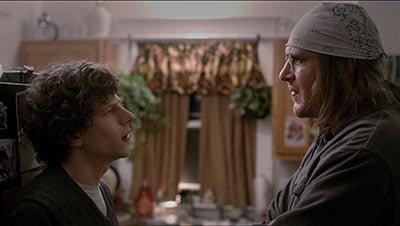
When David Foster Wallace died in 2008, the world lost a literary genius. His novel, “Infinite Jest,” had become the staple of college literature classes across the country, and his philosophical and almost poetic outlook on life spoke to countless millenials. James Ponsoldt’s latest film “The End of the Tour” follows a week in the life of Wallace as Rolling Stone’s David Lipsky interviews him (this would become Lipsky’s novel “Although Of Course You End Up Becoming Yourself”). Like his past films, “The End of the Tour” focuses on how an interaction between two characters can change one or both of their lives in emotionally potent ways.
Wallace is played by Jason Segel, walking heavily, downtrodden, like the weight of the world is on his shoulders. He is on the last stretch of his book tour for “Infinite Jest,” the one thousand page, three-pound text that took the world by storm. His counterpart in Ponsoldt’s journey is David Lipsky (Jesse Eisenberg), a quiet, meticulous writer for Rolling Stone attempting to field a piece on Wallace. The film that ensues is not so much concerned with the works of a troubled literary genius, and more about what made Wallace so troubled to begin with.
This is perhaps Ponsoldt’s most thought-provoking film to date, due in part to the subject matter at hand, but also because it feels like it’s tackling more issues than are initially apparent. The ideas of isolation and fame are of course in the forefront, but Ponsoldt, with a script from the brilliant Donald Margulies, digs deeper into what Wallace represented. He trades out focusing on the works and more on the intimate one-on-one conversations the author had with Lipsky; some funny, some incredibly sad. They address companionship, the worth of art, addiction, and the threat of loneliness.
It’s an intricate portrait of a suffering artist, and Ponsoldt is aware of this, as well as aware of the humanity he wishes to explore in the relationship of two writers with two incredibly different outlooks on life. In this, he succeeds brilliantly and beautifully, creating a film that incorporates bold philosophical inquiries that don’t necessarily get answered so much as contemplated, and that in itself is a thing of majestic quality.
However, Ponsoldt’s film would be nothing without the incredible talent of his leading men. Jason Segel loses himself in the role of Wallace, going into depths some may have thought incapable of the primarily comedic actor. He’s a lost soul, endlessly moody, self-aware, and above all incredibly honest regardless of how he comes across to others. Segel balances every nuance of Wallace with grace and reservation that he becomes less of an actor and more of an embodiment of the famed writer. It’s a joy to watch him on screen, and is a performance well worth dozens of awards.
Opposite him is Jesse Eisenberg, who is no stranger to drama (see his brilliant performance in “The Social Network”), and is just as outstanding in this film. His portrayal of David Lipsky is incredibly nuanced and remarkably subtle, never taking away attention from Segel, but never drawing attention away from himself. He compliments Segel’s intensity and makes the banter between them appear ever more natural, as if these events were truly unfolding before the eyes of the audience. In this he is the perfect foil for Segel’s David Foster Wallace and their chemistry is far too great to imagine anyone else in their places.
James Ponsoldt could have made a biopic encapsulating the entire life of David Foster Wallace, up to his tragic end, but has instead made a work of much more potent beauty. By focusing on just a few days of Wallace’s life, Ponsoldt emulates a raw state of emotion that speaks more about Wallace’s philosophy than his books ever could. With honest performances by Jason Segel and Jesse Eisenberg, “The End of the Tour” is perhaps the most strikingly brilliant film of the year, and quite possibly the best.

